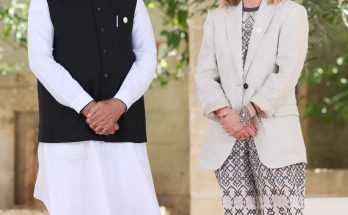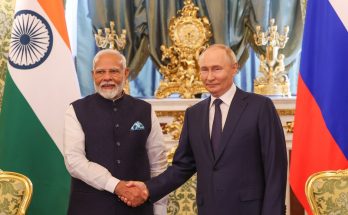
Amid the continuing border standoff between India and China and the Taliban takeover in Afghanistan, Prime Minister Narendra Modi will virtually host the 13th BRICS summit that will test BRICS unity and solidarity in the face of common challenges.
Dealing with the Taliban-ruled Afghanistan has brought to the fore divergences between the Big Three of BRICS – India, Russia and China. In the immediate aftermath of the Taliban takeover on August 15 China and Russia, all too happy to see the back of American troops, indicated that they would be open to engaging and even recognizing the Taliban regime. However, since the formation of the all-male and nearly exclusive Taliban government on September 7, Moscow, for one, seem to have changed its perception and is set to accelerate its cooperation with India in Afghanistan. China has pledged $31 million for the Taliban-ruled Islamic Emirate of Afghanistan.
Counter-Terror Action Plan
India, on the other hand, is in no hurry to engage the Taliban regime as many virulently anti-India figures such as Shirajuddin Haqqani , the suspected mastermind of the 2008 attacks on the Indian embassy in Kabul, feature in the Pakistan-brokered Taliban government unveiled on September 7. Against this backdrop, it will be interesting to see the BRICS’ formulation on Afghanistan in the New Delhi Declaration that is unveiled after the virtual summit between PM Modi and the other BRICS leaders – Chinese President Xi Jinping, Russian President Vladimir Putin, Brazil’s President Jair Bolsonaro and South African President Cyril Ramaphosa.
Reliable sources disclosed that India will be pushing hard for strong language on safe havens and sanctuaries of terror to pin down Pakistan for its widely documented role in cross-border terror attacks. China, the all-weather patron of Pakistan, may not, however, agree to such a formulation that could suggest targeting of Islamabad. However, despite some dissonance, the leaders of five countries are expected to adopt Counter-Terrorism Action Plan, a key deliverable of the Indian presidency of BRICS.
The BRICS counter-terrorism action plan will be result-oriented and focus on pragmatic cooperation, which will include, among other things, intelligence and information sharing among law enforcement agencies for preventing and combating terrorism; inter-agency cooperation; and sharing of best practices for curbing radicalisation and misuse of the internet by terrorists. The action plan also envisages enhanced cooperation in the growth of illegal drug production and trafficking in the region.
What’s on the agenda?

Besides counter-terror action plan, the BRICS summit will see concrete progress on other crucial areas India has identified as major priorities for its BRICS presidency, which include: I) Reform of the multilateral system II) Technological and digital solutions to achieve SDGs III) Enhancing People-to-people cooperation.
Of these, accelerating reform of global governance institutions to reflect contemporary realities will receive top-level attention at the summit. At the summit, PM Modi is expected to send a strong message to the world, underlining the urgent need to fast-track the long-pending reform of global governance institutions, including political and economic, to reflect shift of power from West to the rest. The BRICS leaders are expected to formally approve the standalone joint statement on “reforming and strengthening the multilateral system,” which emerged out of the meeting of BRICS foreign ministers on June 1.
India is pushing for a holistic approach on the issue of global governance reforms by including in its ambit not only reform and expansion of the UN Security Council but also that of other key global institutions such as International Monetary Fund (IMF), World Bank (WB), World Trade Organization (WTO) and World Health Organization (WHO).
The summit will also see joint advocacy by the leaders of five countries for the India-South Africa proposal in the WTO for patents waiver of anti-corona vaccines. The BRICS joint declaration will press the World Trade Organization (WTO) to make an early decision on waiving the intellectual property rights for COVID vaccines.
The summit will focus on concretizing digital and technological solutions for the achievement of Sustainable Development Goals (SDGs) in the context of various BRICS mechanisms. This will be reflected in key outcomes at the summit, including a BRICS portal for Digital Public Goods.
BRICS versus Quad
Significantly, the BRICS summit is taking place barely a fortnight ahead of the Quad summit of like-minded democracies, including India, US, Japan and Australia. The leaders of the BRICS have to raise the bar at the summit if they want the grouping to retain the momentum and global attention that seems to have been hijacked by the Quad.
It’s, however, not a choice between the BRICS and Quad for India as each of them have a separate founding rationale. Despite emerging contradictions in the BRICS, India will continue to juggle BRICS and Quad as a testament of its strategic autonomy.
Author Profile

- Manish Chand is Founder-CEO and Editor-in-Chief of India Writes Network (www.indiawrites.org) and India and World, a pioneering magazine focused on international affairs. He is CEO/Director of TGII Media Private Limited, an India-based media, publishing, research and consultancy company.
Latest entries
 India and the WorldJuly 9, 2024Defying West, India sets $100 billion trade target with Russia
India and the WorldJuly 9, 2024Defying West, India sets $100 billion trade target with Russia India and the WorldJuly 5, 2024India at SCO: Takes swipe at Pakistan for cross-border terror, pushes alternative to BRI
India and the WorldJuly 5, 2024India at SCO: Takes swipe at Pakistan for cross-border terror, pushes alternative to BRI India and the WorldJune 14, 2024Modi’s Day 1 in Italy: Bonding with Britain, France
India and the WorldJune 14, 2024Modi’s Day 1 in Italy: Bonding with Britain, France India and the WorldJune 13, 2024G7 summit in Italy: Modi to showcase India as leader of Global South
India and the WorldJune 13, 2024G7 summit in Italy: Modi to showcase India as leader of Global South






